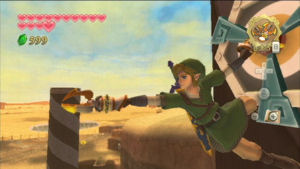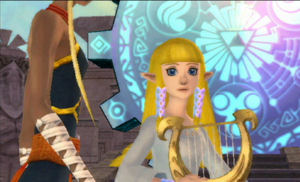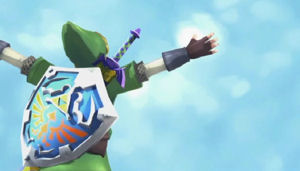Solo Gamer Review: The Legend of Zelda: Skyward Sword - Page 2
 | | Fear not; you'll get to dual-wield clawshots |
The most dramatic tweak, however, is in overworld exploration. Ever since Ocarina of Time, there has been a large, spartan open world to explore. The surface world of Skyward Sword is, in many ways, a giant dungeon, with enemies, obstacles, and puzzles at every turn. The closest it gets to an overworld is the area above the clouds, which is made up of a spattering of floating landmasses. This overworld is most comparable to Windwaker--including a return of a living, red vehicle and the traveling salesman Beedle--but traversing it isn't nearly as tedious or slow. Another plus is that Tingle is nowhere to be found as an actual character, though eagle-eyed explorers can find him. There are things to do above the clouds, such as purchasing upgrades and items, opening treasure chests that must be unlocked from the world below, and participating in a handful of sidequests for the citizens of Skyloft, but the vast majority of the game is played on the surface, where you are repeatedly challenged and encouraged to backtrack. The Metroid-style backtracking has a few surprises, however, as familiar locations sometimes undergo very dramatic and unexpected changes that always keep you on your toes.
A new addition is the stamina meter, which depletes whenever you sprint, climb, or power attack but replenishes itself relatively quickly. At first, the meter feels like a terrible handicap, but once you get used to it, it starts to make sense as an integral part of the game. It can be frustrating if you just want to sprint from place to place, but if it gets too bothersome, you can always purchase a potion that turns it off for three minutes. One missed opportunity, however, is that this game would have been a perfect place to bring back the sword dash from A Link to the Past.
Still, there are some obscure items from previous games that have been brought back or reimagined. For example, the Gust Jar from The Minish Cap makes a return appearance in the form of the Gust Bellows, which is a Zeldafied leaf blower that is way more useful than it sounds in light of the game's impressive physics. The items, as a whole, are wildly successful, with narry a useless one in the bunch. It takes forever to acquire the bow and arrow, though there are arrows to purchase from the start, but by the time you finally get to them, you will be adept with the other items, including the flying Beetle, which is more of a versatile homing missile than a boomerang. The game also makes sure that every item is needed frequently, so that you won't feel like anything is taking up unnecessary space in your inventory or that the puzzles are too repetitive.
Having said all that, though, I have to admit there are still some nitpicks that can drive players crazy. As with Twilight Princess, the game likes to redundantly remind you of certain things whenever you load up the game, regardless of how far along you are. Twilight Princess, which had to remind you of the value of every color rupee, was probably worse, but Skyward Sword, which has a wide variety of collectable items and bugs, is just as guilty of this annoying habit. I don't need to be reminded of what an amber relic is or that nobody knows where it gets its shape every single time I start playing and pick one up. Another example is the town of Skyloft. Above the clouds, you can skydive onto any island, and where you land is often very important. However, if you skydive onto the main landmass, Skyloft, you are forced to land in one of four or five preset locations, which is infuriating seeing as how certain sidequests require you to reach high places that would be much easier to access if you could just skydive onto them.
|
[Gameplay: 9.5 - Though there are some little annoyances in the design, the controls and difficulty are arguably the best and most balanced of the entire series, and many of the problems plaguing recent Zelda titles have been repaired]
|
|
PRESENTATION
 | | The harp: the only musical intrument more effeminate than an ocarina |
No doubt the greatest weakness of Skyward Sword is its presentation. Despite an amazing story and incredible gameplay, the Wii is incapable of impressing on a technical level. The graphics feel painfully dated, and the lack of voice acting feels like a quaint throwback to older generations of gaming. Skyward Sword won't bring in many newcomers who have been raised by HD visuals and a lack of scrolling text boxes, making these design necessities a truly unfortunate drawback that only Zelda fans will be able to forgive. If the next Zelda title is unable to provide an HD experience with actual voice acting, the series will not survive much longer in the 21st Century.
Granted, the low-definition graphics are improved by a unique impressionistic art-style which can be quite beautiful, especially with some of the game's more impressive landscapes and dungeons. However, in tight spaces or up close, this style falls apart into a muddy, pixelated mess that is really cringeworthy. One thing you should never feel is sorry for the game designers, but that's how the texture mapping makes me feel, because if it's not a result of the Wii's limitations, it is truly unforgiveable.
There are some other odd choices worth mentioning. For instance, unless you deliberately turn it off, there is a controller map display that takes up a full quarter of the screen. That's just ridiculous and completely unnecessary. A five year old can figure out how to remember the controls on even the most complicated and nonintuitive video game, and the controls here aren't exactly rocket science.
On the other hand, the music in Skyward Sword is incredible. This is the first Zelda game to be fully orchestrated, and it adds a meaty dimension of gravitas to every scene, reinforcing the more cinematic attitude of the game in general. There are variations on familiar themes, brand new themes, and one or two complete renditions of the classic Zelda themes that come at just the right moment for maximum dramatic effect. The music is, in a word, beautiful.
As a side note, for those who preordered Skyward Sword, there is a symphonic CD of a handful of Zelda greats--including the Skyward Sword theme--and it is probably the best compilation of original video game music I've ever heard; it is better than many movie soundtracks.
Given all that, it's hard to come up with a fair presentation score. The difficulty lies in finding the fuzzy line between design flaws and hardware limitations, and in deciding how much that line matters. If you try to compare Skyward Sword to a more sophisticated game, technically speaking, it would deserve a painfully low score here. However, if you compare it to earlier Zelda games, even the technically impressive Twilight Princess, Skyward Sword stands strong and proud at the top. It's hard to forgive the seemingly outdated graphics and unnecessary Nintendo handholding, but it's also hard to put all the onus on Skyward Sword rather than on the Wii itself. For these reasons--and because of the amazing music--I am going to err on the side of forgiveness, giving Skyward Sword a generous 8.5 in presentation.
|
[Presentation: 8.5 - The graphics and lack of voice acting need to be a thing of the past, but the weaknesses in the game's presentation are more attributable to the hardware than the software]
|
|
CONCLUSION
 | | Excuse me while I kiss the sky |
The inevitable question you may be asking is where Skyward Sword stands in my estimation in relation to Ocarina of Time, a game I have repeatedly refered to as the greatest video game ever made. On a technical level, Skyward Sword is indeed a superior experience, and I'm not just talking about processing power. Skyward Sword uses and refines ideas that have been evolving for years throughout the gaming industry, and for that reason, it is a better game than Ocarina of Time could have ever been. It's easy, in retrospect, to come up with theoretical ways that modern gaming conventions could improve upon Ocarina of Time or how a remastered version of Ocarina of Time could be better than the original (as I imagine the 3DS remake is).
On the other hand, it is important, when you start trying to list the greatest video games ever made, to place every game in the context of its time. In its day, there was little question that Ocarina of Time was the pinnacle of video game design. Even though the N64 wasn't the most technically impressive console out there at the time, Ocarina of Time still managed to be a better game than anything else on the market. That's why I will still argue that Ocarina of Time is the greatest video game ever made, even though I will also argue that Skyward Sword is better than Ocarina of Time.
That's what you should take away from this review. I am willing to concede that Skyward Sword has its flaws and I do not believe it deserves a perfect score, but at the end of the day, it's a better game than Ocarina of Time, and I am a total slut for Ocarina of Time. If you have ever liked a Zelda game, you should play Skyward Sword, because it is the ultimate Zelda experience. If you are too busy playing Skyrim or Call of Duty: Modern Warfare 3 and having orgasms over how amazing it is to be able to pluck butterfly wings or shoot Russians in high definition, though, you might be the kind of player who will be unable to see the greatness beneath the franchise's all-too-apparent age lines.
FINAL TALLY
STORY: 10
GAMEPLAY: 9.5
PRESENTATION: 8.5
SOLO GAME SCORE: 10
TOTAL SCORE: 9.5
This Zelda game is better in almost every way than its predecessors, with a story that is amazing and gameplay that is stunningly sophisticated, but it may seem a little dated to modern gamers spoiled by technologically superior gaming platforms. |
|
-e. magill 12/13/2011
|
|